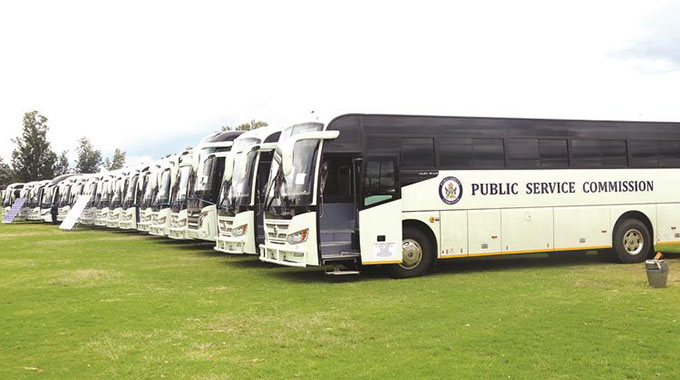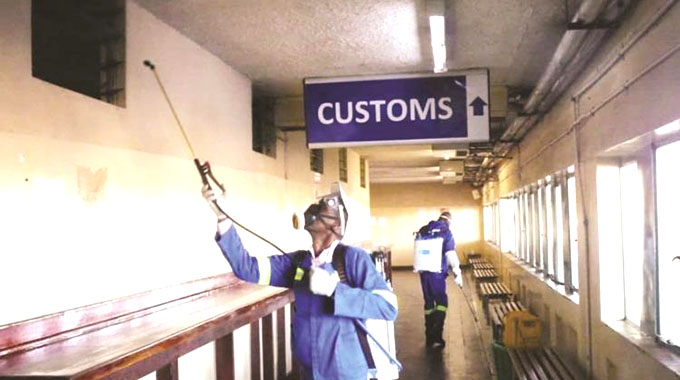Public Service: Creating opportunities for all citizens

Elliot Ziwira Senior Writer
As the countdown to Zimbabwe’s 40th anniversary enters the homestretch, the need arises to reflect on the milestones achieved through Government efforts since Independence in 1980.
Colonisation upset the indigenous people’s social, political and economic systems which heightened social risks. Capitalistic concepts of industrialisation and manufacturing introduced a monetary economy where labour was bought and sold, previously unknown to Africans; as a result risks such as unemployment, occupational injuries, invalidity, and accommodation challenges were created.
The Rhodesian governance system fashioned through a bottlenecked education scheme closed out blacks from the public service, particularly in crucial institutions and departments. Professions open to blacks were teaching and nursing with scanty prospects for promotion and much lower salaries as compared to those earned by whites. Blacks rarely rose above menial work, and had no access to mortgage financing, or any such housing programmes meant for civil servants.
Since Independence, the Ministry of Public Service, Labour and Social Welfare has played a significant role in empowering citizens through provision of social security, and promotion of favourable conditions in the labour market by encouraging win-win negotiation outcomes, as well as training of personnel to fill in the gap left by white Rhodesians.
The ministry is headed by Honourable Paul Mavima who is deputised by Honourable Lovemore Matuke. Mr Simon Masanga is the Permanent Secretary.
Mandate
The Ministry of Public Service, Labour and Social Welfare’s obligation is to provide comprehensive social security to all Zimbabweans, and promote a conducive labour market environment.
Functions
Spurred on by the vision to provide a social security system that promotes decent standard of living and a labour market milieu that guarantees access to decent jobs for all citizens, the ministry aims to promote fair labour practices, labour productivity, self-reliance and social protection so as to improve the social and economic wellbeing of all Zimbabweans. To achieve its mandate, the ministry maintains links with labour organisations or bodies like the International Labour Organisation (ILO) for upholding of international labour standards. The ministry also undertakes to reduce poverty and heighten self-reliance through provision of social protection services to vulnerable and disadvantaged groups in Zimbabwe; and administers the Basic Education Assistance Module (BEAM) and other child protection initiatives.
Reflections on the colonial legacy
The introduction of a money-powered economy robbed Africans of their traditional social security systems premised on livestock, mining and agriculture. Repressive and discriminatory colonial legislation divested them of the land and all that it comprises; wildlife, cattle and minerals.
With their traditional routes of livelihoods gone, the indigenous people found themselves in urban areas and mines where a money economy was thriving, and where sweat and blood could be sold for silver coins.
The industrial apparatus of oppression presented social risks like injuries, work-related deaths, poverty, unemployment and accommodation shortages. These challenges required redress through such social instruments like old age pension schemes, occupational pension programmes and workman compensation arrangements.
However, such schemes were the preserve for white Rhodesians.
The Industrial Conciliation Act of 1934 barred Africans from jobs exclusively reserved for whites, and excluded them from industrial agreements negotiated under it. Wage negotiations and skilled employment were conserved for whites. Blacks simply provided labour to the booming industrial hub with nothing to show for their efforts.
Although the Act was later amended in 1959, it excluded Africans in domestic services and the agricultural sector.
There were no trade unions meant for Africans in Rhodesia before 1949. The Railway African Workers’ Union was formed in 1949 and dissolved in 1967. Other unions which became noticeable in the early 1960s were the United Textiles Workers’ Union, Bulawayo and Salisbury Municipal Workers’ Union and Rhodesia Tailors and Garment Workers’ Union.
All these powerful African trade unions were reined in when Ian Smith’s Rhodesian Front amended the Law and Order (Maintenance) Act of 1960. Under the Act, it was an offence to participate in industrial actions (strikes) in essential sectors like food and fuel industries. Engaging in any political activities deemed to endanger the public was banned under this Act.
The influx of blacks into towns in response to the migratory bird’s imploration to sweat it out in the factories and mines as labourers led to the development of a hostel system. The hostels, which were constructed near factories, exposing blacks to grime, were however, not meant for couples. Women were not allowed in, therefore, married blacks were separated from their wives for periods of time, since they had to remain in the rural areas where they had to eke it out on unproductive soils.
With the expansion of colonial capital, demand for accommodation surged, hence, African townships intended for families, like Highfield, Kambuzuma, Mpopoma, Seke, St Mary’s, Chinotimba, Rimuka, Amaveni and Mucheke were born.
Without any meaningful social protection, barred from effective trade unionism and closed out of mortgage financing, blacks were exposed to poverty and other social ills that come with it.
The journey and milestones
The Government of Zimbabwe’s immediate task at Independence in 1980 was correcting colonial imbalances in remuneration, recruiting deserving citizens into the public service on a non-partisan basis, crafting of a comprehensive social protection framework and giving employers and employees platforms to engage with the aim to foster win-win outcomes.
The advent of majority rule disturbed the status quo which white Rhodesians sought to uphold, hence most of them were caught up between a rock and hard surface. Befuddled by the news of the coming of age of the nation of Zimbabwe under a black Government, most whites either remained ensconced in past glory, or moved to South Africa, New Zealand, Australia, United States of America, Canada or the United Kingdom.
Even though the new Government was willing to take them aboard, and even offered incentives to retain them, so that they could learn the ropes from them, they simply could not stomach the idea of being led by the same “terrorists” who engaged them in the trenches of struggle.
Rhodies took “the gap”, embarked on the “chicken run”, or boarded the “wise owl” plane in a bid to put their backs to the reality of Independence for the people of colour whom they so much loved to chide. As a result they left gaps in the civil service that needed to be filled.
The Government, therefore, called upon Zimbabweans living abroad to come home and actively participate in the development of their country, and at the same time embarked on an ambitious programme to train middle and senior civil servants.
In 1980, there were 30 900 blacks, 1 600 coloureds, 400 Asians and 12 800 whites in the civil service.
After the resignation of 949 civil servants by October 1980, then Public Service Minister Richard Hove, revealed that 620 Zimbabweans living in the Diaspora had applied for employment home, of whom 49 had already been appointed, and 152 were being considered (The Herald 9 October 1980).
Also up for consideration was the Public Services Board’s (now Public Service Commission). recommendation to the Government to promote Africans to higher posts in the civil services which were previously reserved for whites. Colonial inequalities reduced blacks to messengers, junior clerks and cleaners regardless of ability.
Besides giving Zimbabweans equal opportunities regardless of race, ethnicity or political affiliation, Government also moved to correct discrepancies in salaries based on race before Independence.
To battle poverty and foster human growth, the Ministry of Public Service, Labour and Social Welfare crafted social protection mechanisms premised on the Rhodesian concept, but different in its socio-political reality and economic inclusiveness. In response to such a reality, the National Social Security Authority of Zimbabwe (NSSA) was established in 1994 as provided for in the NSSA Act of 1989 (Chapter 17:04).
The philosophy behind the provision of social security, as has been alluded earlier on, is to mitigate social risks such as those prompted by sickness, occupational injuries, unemployment, invalidity, old age, retirement and death.
Currently, NSSA administers two schemes: Pension and Other Benefits Scheme and Accident Prevention and Workers’ Compensation Scheme.
However, like any other institution, NSSA has not been spared of financial challenges which have left thousands of pensioners hard done due to inflationary pressures.
For social security providers like NSSA to honour their obligation to citizens, need arises to enforce compliance on the part of employers, who have a tendency to deduct pension contributions from employees, yet years running, they do not remit the money to authorised pension funds as required by the law. They hold onto the money, which legally is not theirs, and when pensioners seek recompense from pension funds and insurance firms, they are told that their employers are still to honour their end of the bargain.
Seized with the provision of social security to all Zimbabweans with the view to mitigate poverty and enhance human development for the common good, the ministry takes active participation not only in the way NSSA is run, but how other non-State stakeholders play their part towards the same goal—social protection.
To that end, the Government crafted a National Social Protection Policy Framework (NSPPF).
In Rhodesia the labour market was skewed in favour of white employers with blacks playing no participatory role in how their work could change outcomes for them. Industrial actions were outlawed, and trade unionism was gagged.
Independence brought new meanings to labour practices and labour productivity through legislation that allowed for negotiation platforms, and withholding of labour if all else fails as provided for in the Constitution of Zimbabwe. Every Zimbabwean has a right to be represented or join a trade union of his/her choice.
The ministry is mindful of the essence of collective bargaining and negotiation in the creation of a conducive labour market environment.
As Flippo (1984:442) points out, collective bargaining “is a communication process in which representatives of two groups meet and attempt to negotiate an agreement which specifies the nature of the agreement between them”.
Collective bargaining is usually concerned with the relations existing between unions representing employers and employees in a quest to address pressing issues such as wages, hours of work and other conditions of employment (Beach, 1985 in “Personnel: The Management of People At Work”).
As posited by Freeman (1992:125), collective bargaining is “the process of negotiating and administering agreement between labour and management concerning wages, working conditions and other aspects of the work environment”.
Thus, collective bargaining as posited by Beach (1985), Flippo (1984) and Freeman (1992), is the collective effort of individual groups with different interests concerning the same cake, the sharing of which should not be seen to jeopardise either party’s interests.
Because collective bargaining is a collective effort by conflicting parties, whose idea is not to kill the hen that lays golden eggs, but to preserve and feed it so that more eggs may be obtained, it is an important form of negotiation. As it exists exclusively in labour relations involving employees and employers, it is imperative that the interests of either party are respected; because they both need each other in the same way an offspring requires the genes of either parent.
Employers need their employees for the sake of production, for production is the lifeline of their businesses, and employees need their employers for their livelihoods, so they cannot afford to bite the hand that feeds them. As such, both parties need to work collectively because a collective voice is usually heard, unlike that of one calling in the wilderness.
In Zimbabwe, management, representing employers and other stakeholders, and labour represented by respective bodies should always meet to discuss pertinent issues that may be affecting them.
If collective bargaining is conducted in good faith, conflict between employers and employees is mitigated, as problems are solved jointly through mutual trust. If both parties lay their cards on the table there is no need for haggling. If employers, especially in these trying economic times, are open to their employees about the rising costs of production which cut into their profits, the workers will take it in good faith and will not raise outrageous demands. But if management decides to play the wise owl in the eyes of the “dumb” workers, matters may get out of hand.
Collective bargaining in Zimbabwe takes place at two levels; national and local. At national level the umbrella bodies like the Zimbabwe Congress of Trade Unions (ZCTU), Zimbabwe Federation of Trade Unions and the Apex Council meet with representative employer bodies like the Bakers’ Association of Zimbabwe, Zimbabwe Commercial Farmers’ Union and the Bankers’ Association of Zimbabwe among many others, and negotiate on behalf of their affiliate member organisations. At the local level workers’ committees can directly engage in dialogue with their employers through management.
The Apex Council negotiates with the Government on behalf of civil servants. Because they need each other for the common good to prevail, their engagements have always been fruitful, although in some instances emotions are known to flare.
Another noble initiative towards effective bargaining is the National Joint Negotiating Council (NJNC), a platform that brings to the negotiating table Government and workers’ representatives.
The Labour Court is handy as an arbiter to settle disputes if bargaining is impeded by coercion. The International Labour Organisation (ILO), whose links the Ministry of Public Service, Labour and Social Welfare keeps open, also functions as an arbitrator in labour issues.
Alive to the fact that there is no poverty that beats the poverty of homelessness, the Ministry of Public Service, Labour and Social Welfare committed to provision of affordable housing for its workers by signing a Memorandum of Agreement with National Building Society (NBS) to roll out a $60 million housing facility for them in 2019.
The noble move which speaks to the needs of the Government’s close to 500 000 workers in more than monetary terms, augments similar schemes that have seen houses and flats constructed for civil servants across the country since the 1980s through Public-Private Partnerships (PPPs).
Private players, with Government support, can get opportunities in the construction sector, a case of profitable social responsibility. What should be guarded against though, is profiteering at the expense of the same people they purport to be helping.
It is imperative to decipher that the issue of housing is a thorny one the world over, and for Government — a major employer — to cater for all its employees, takes more than money, since it cannot be done at one go.
Yes, $60 million may appear insignificant if it is read in relation to the Government’s labour force, but there should always be a starting point, a willingness to work towards the provision of shelter. As a revolving fund, the money will go a long way in addressing non-monetary issues that come with remuneration of workers.
To express his commitment to the welfare of civil servants, in August 2019, President Mnangagwa commissioned 25 buses to boost the Public Service Commission (PSC) fleet. In March 2020, the President handed over 33 more buses to the PSC to ferry civil servants, more than doubling its fleet.
At the level of social protection for the vulnerable, the ministry has not been caught napping. In 2019 the ministry, in collaboration with donors, provided 756 980 households with food aid in rural and urban areas (Harare and Bulawayo). Plans were underway to spread the programme to other urban centres.
Urban hunger was attributed to poor rains in the 2018/2019 cropping season due to El Nino, resulting in poor urban families who engage in urban agriculture failing to get meaningful yields.
Through the Basic Education Assistance Module (BEAM) established in 2001, the ministry facilitated the enrolment and retention of orphaned and vulnerable children in rural and urban communities through provision of tuition fees, school levies and examination fees. The programme is part of the Enhanced Social Protection Programme (ESPP) aimed at providing basic education to all Zimbabweans as enshrined in the Education Act of 1987.
In 2018, the Government partnered Vana/Bantwana project to redesign BEAM with the view to create a better system for all children.
With Zimbabwe’s 40th birthday around the corner, it is only apt to celebrate the mileposts passed thus far since Independence in 1980 through the Ministry of Public Service, Labour and Social Welfare’s efforts to create equal opportunities for all citizens.









Comments